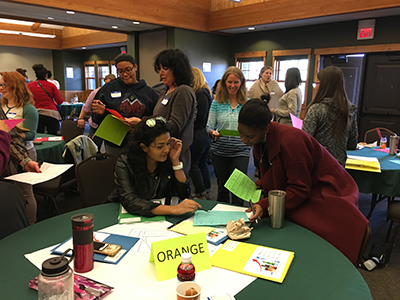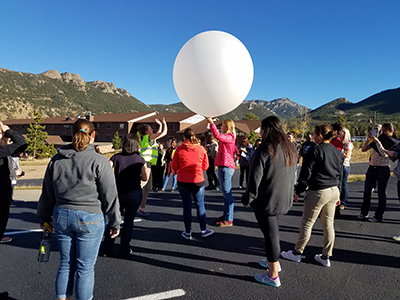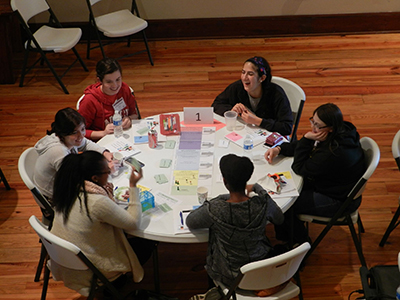Women are underrepresented in the geosciences, in part because of systemic attitudes and behaviors [e.g., Rosen, 2017]. Why do we need to close this gap? Diverse teams produce better ideas—they set the bar for scholarly excellence [McLeod et al., 1996]. So what are the best ways to welcome the next generation of women into geoscience careers?
Born from Collaboration
The Earth Science Women’s Network (ESWN) set out to find and test some answers to this question. ESWN, an organization with more than 3,000 members around the world, focuses on the peer mentoring and professional development of early-career women at the graduate and postdoc levels. This organization grew out of an informal gathering of six early-career women at the 2002 Fall Meeting of the American Geophysical Union.
Our experiment has developed into an effective and scalable program that may be part of the solution to the gender gap in the geosciences.
In 2014, members of the ESWN Leadership Board sought out expertise in gender and quantitative educational psychology. We wanted to find out the effects of connecting undergraduate women to a same-gender mentoring network and challenging their perceptions of their ability to succeed in science. We designed an experiment to quantify and qualify such effects on first- and second-year undergraduate women.
We implemented our experiment at nine universities in two U.S. regions (Colorado/Wyoming Front Range and North and South Carolina) between fall 2015 and fall 2016. We are now halfway through our National Science Foundation–funded project, and we see positive results [Hernandez et al., 2017]: Undergraduate women with large mentoring networks that include faculty mentors are more likely than those without such networks to identify as scientists and are more intent on pursuing the geosciences.

Our experiment has developed into an effective and scalable program that benefits the undergraduate women it serves and thus may be part of the solution to the gender gap in the geosciences. Although we are still learning the full effect of our intentionally designed mentoring experiment, the early results are robust enough for us to share the general format of the resulting program in the hope that similar programs can be implemented at additional universities.
A Recipe for PROGRESS
This program, the Promoting Geoscience, Research, Education and Success (PROGRESS) framework, offers three resources to undergraduate participants: a professional development workshop, access to female mentors and role models, and online discussions and resources. Many of the PROGRESS volunteer mentors and role models are also members of ESWN.
Here we explain the essential components of our professional development workshop because this module of PROGRESS is mature and ready to be propagated. The goals of this first intervention component are as follows:
- to introduce the women to geoscience careers
- to establish connections among students
- to help participants identify role models and the value of mentoring
- to discuss how to overcome expected hurdles
The workshop module begins with an introduction to the geosciences that focuses on teamwork and societal context. Why? People value people-oriented work environments [Su and Rounds, 2015], and linking to societal context enhances learning.
Two panel discussions follow this introduction. Each panel features women representing different ethnic, career, and other perspectives because when people see others like themselves succeeding, they feel like they belong [Rattan et al., 2012]. Panelists give “Ignite”-style presentations—5 minutes, 20 slides—followed by student questions. In the first panel, the women present their career and personal pathways. The second panel has a “day in the life” theme because exposure to women succeeding in counterstereotypic roles helps break down stereotypes [Zawadzki et al., 2013].
Engaging the Participants
Seeing specific factors that fuel curiosity, frustration, and thrill of discovery in the geosciences is important to students. To add more exposure to women doing science, we offer our workshop participants hands-on activities, including a weather balloon launch, a Doppler on Wheels demonstration, and a water quality experiment.

The workshop introduces gender stereotypes and biases—discussing these issues is important for overcoming their effects. We introduce these topics via a board game [Shields et al., 2011] and using group exercises, including a modified version of the Implicit Association Test (IAT) that helps reveal unconscious attitudes toward gender. The students also identify other stereotypes (e.g., socioeconomic status and race), and we review the ubiquity of these issues.
Throughout the session, the facilitator reiterates that ability can be improved with effort. This conception appears important for building academic tenacity [Dweck et al., 2014] and overcoming the effects of stereotype threat—the idea that people underperform when they feel at risk of conforming to negative stereotypes surrounding their social group [Good et al., 2003]. Discussions also offer the chance for students to validate sexism and racism they may have experienced [Moss-Racusin et al., 2012].
A Network of Support
PROGRESS students consider all the support they will need by completing a mentor map exercise, where they reflect on who advocates for them, who they turn to for scientific advice, who gives them safe spaces to discuss their frustrations, etc. [Glessmer et al., 2015]. Supportive connections help students attain academic goals [Skahill, 2002]. We also teach skills like constructing emails to help students connect themselves to faculty.
Same-gender mentoring can be more effective than cross-gender mentoring for female undergraduates.
Following the workshop, students can be paired with a mentor who also identifies as a woman in science, technology, engineering, and mathematics (STEM), or they can continue their interactions with each other via campus get-togethers. There is evidence that same-gender mentoring can be more effective than cross-gender mentoring for female undergraduates [Blake-Beard et al., 2011].
As discussed in a recent National Academy of Sciences report, more research is needed on how to foster effective mentoring relationships. We are exploring multiple models, such as one-to-one versus group mentoring, and also different ways of pairing students with mentors on the basis of perceived similar interests [Gehlbach et al., 2016].
We do not yet know which strategy is better, but our program is already serving women across multiple institutions in two U.S. regions, which speaks to its transferability. In addition to a website, we have a closed Facebook group where we share news, internships, and other professional development opportunities, and students can also seek advice on their challenge du jour [Ellison et al., 2007].

PROGRESS to Date
As a result of our study, we found that PROGRESS participants develop larger mentor networks than their peers and that having a faculty mentor is related to greater personal identity as a scientist and greater intent on pursuing the geosciences. This is a critical result because most students who change their major away from STEM do so early in their college education.
Many of our PROGRESS participants, who began the program as freshmen and sophomores, are now thinking about graduation and planning for their next steps. As we continue to track the women in the PROGRESS program, we will continue to update the geoscience community on widely transferable aspects of our research. All of our PROGRESS materials are available online for anyone who wants to start a similar program.
Acknowledgments
Support was provided by the National Science Foundation (DUE-1431795, DUE-1431823, and DUE-1460229). We thank all our volunteer mentors.
References
Blake-Beard, S., et al. (2011), Matching by race and gender in mentoring relationships: Keeping our eyes on the prize, J. Soc. Issues, 67(3), 622–643, https://doi.org/10.1111/j.1540-4560.2011.01717.x.
Dweck, C. S., G. M. Walton, and G. L. Cohen (2014), Academic tenacity: Mindsets and skills that promote long-term learning, Bill & Melinda Gates Found., Seattle, Wash., https://ed.stanford.edu/sites/default/files/manual/dweck-walton-cohen-2014.pdf.
Ellison, N. B., C. Steinfield, and C. Lampe (2007), The benefits of Facebook “friends:” Social capital and college students’ use of online social network sites, J. Comput. Mediated Commun., 12(4), 1,143–1,168, https://doi.org/10.1111/j.1083-6101.2007.00367.x.
Gehlbach, H., et al. (2016), Creating birds of similar feathers: Leveraging similarity to improve teacher–student relationships and academic achievement, J. Educ. Psychol., 108(3), 342–352, https://doi.org/10.1037/edu0000042.
Glessmer, M. S., et al. (2015), Taking ownership of your own mentoring: Lessons learned from participating in the Earth Science Women’s Network, in The Mentoring Continuum: From Graduate School Through Tenure, edited by G. Wright, pp. 113–132, Syracuse Univ. Grad. Sch. Press, Syracuse, N.Y.
Good, C., J. Aronson, and M. Inzlicht (2003), Improving adolescents’ standardized test performance: An intervention to reduce the effects of stereotype threat, J. Appl. Dev. Psychol., 24(6), 645–662, https://doi.org/10.1016/j.appdev.2003.09.002.
Hernandez, P. R., et al. (2017), Promoting professional identity, motivation, and persistence: Benefits of an informal mentoring program for female undergraduate students, PLoS One, 12(11), e0187531, https://doi.org/10.1371/journal.pone.0187531.
McLeod, P. L., S. A. Lobel, and T. H. Cox Jr. (1996), Ethnic diversity and creativity in small groups, Small Group Res., 27(2), 248–264, https://doi.org/10.1177/1046496496272003.
Moss-Racusin, C. A., et al. (2012), Science faculty’s subtle gender biases favor male students, Proc. Natl. Acad. Sci. U. S. A., 109(41), 16,474–16,479, https://doi.org/10.1073/pnas.1211286109.
Paunesku, D., et al. (2015), Mind-set interventions are a scalable treatment for academic underachievement, Psychol. Sci., 26, 784–793, https://doi.org/10.1177/0956797615571017.
Rattan, A., C. Good, and C. S. Dweck (2012), Why do women opt out? Sense of belonging and women’s representation in mathematics, J. Pers. Soc. Psychol., 102(4), 700–717, https://doi.org/10.1037/a0026659.
Rosen, J. (2017), Data illuminate a mountain of molehills facing women scientists, Eos, 98, https://doi.org/10.1029/2017EO066733.
Shields, S. A., M. Zawadzki, and R. N. Johnson (2011), The impact of the Workshop Activity for Gender Equity Simulation in the Academy (WAGES-Academic) in demonstrating cumulative effects of gender bias, J. Diversity Higher Educ., 4(2), 120–129, https://doi.org/10.1037/a0022953.
Skahill, M. P. (2002), The role of social support network in college persistence among freshman students, J. Coll. Stud. Retention, 4(1), 39–52, https://doi.org/10.2190/LB7C-9AYV-9R84-Q2Q5.
Su, R., and J. Rounds (2015), All STEM fields are not created equal: People and things interests explain gender disparities across STEM fields, Front. Psychol., 6, 189, https://doi.org/10.3389/fpsyg.2015.00189.
Zawadzki, M. J., et al. (2013), Reducing the endorsement of sexism using experiential learning, Psychol. Women Q., 38(1), 75–92, https://doi.org/10.1177/0361684313498573.
Author Information
Emily V. Fischer (email: [email protected]), Colorado State University, Fort Collins; Amanda Adams, University of North Carolina at Charlotte; Rebecca Barnes, Colorado College, Colorado Springs; Brittany Bloodhart and Melissa Burt, Colorado State University, Fort Collins; Sandra Clinton and Elaine Godfrey, University of North Carolina at Charlotte; Ilana Pollack, Colorado State University, Fort Collins; and Paul R. Hernandez, West Virginia University, Morgantown
Citation:
Fischer, E. V.,Adams, A.,Barnes, R.,Bloodhart, B.,Burt, M.,Clinton, S.,Godfrey, E.,Pollack, I., and Hernandez, P. R. (2018), Welcoming women into the geosciences, Eos, 99, https://doi.org/10.1029/2018EO095017. Published on 03 April 2018.
Text © 2018. The authors. CC BY-NC-ND 3.0
Except where otherwise noted, images are subject to copyright. Any reuse without express permission from the copyright owner is prohibited.

